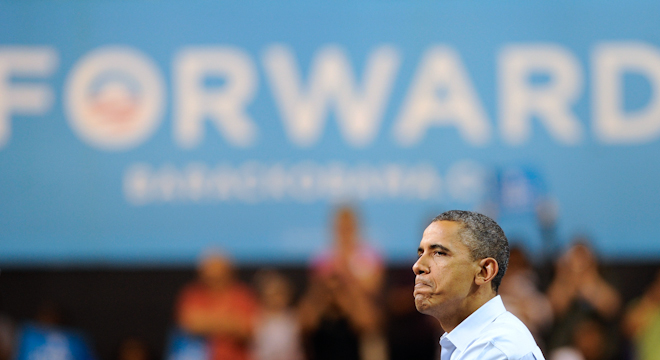President Obama is taking a lot of heat this week for still refusing to articulate his position on same-sex marriage well over a year since he first said “attitudes evolve, including mine.”
But even if Obama does complete the evolution in the way most expect — an eventual endorsement of marriage equality — what, exactly, would it accomplish, beyond a symbolic victory for same-sex marriage activists? Not a whole lot, believe gay rights groups and observers.
It’s an interesting footnote to the debate over Obama’s stance on gay marriage — the fact is, Obama’s basically doing all the things marriage equality advocates want him to do already. Even if he is doing it without saying explicitly whether he supports marriage rights for LGBT couples.
Advocates of marriage equality acknowledge the president supports the repeal of the Defense Of Marriage Act, and presides over a Justice Department that will no longer defend the law in court. They’re happy he’s come out against state ballot initiatives like the one voters in North Carolina will consider Tuesday that would ban legal recognition for same-sex couples. They appreciate that his administration has expanded legal rights to same-sex couples, including hospital visitation.
That makes Obama wildly different from presumptive Republican nominee Mitt Romney. Not only has Romney firmly and flatly said he’s opposed to same-sex marriage — and promised not to “evolve” — last August Romney signed a pledge stating his support for a federal constitutional amendment barring same-sex marriage. Where Obama is opposed to new limitations on same-sex couples’ rights to marry, Romney is in favor of them. This is one of the main arguments the Obama campaign uses to deflect awkward questions about the president’s undefined views on gay marriage, and it’s generally well-received by voters concerned with civil rights for the LGBT community. (That’s not to say it’s all milk and honey, however: Obama is currently facing the ire of some wealthy LGBT donors after he declined to use an executive order to stop federal contractors from discriminating on the basis of sexual orientation, an initiative he supports at the legislative level.)
In any case, the fight to increase marriage equality continues apace, but mostly in places where Obama has little direct involvement. There’s a bill Obama supports in Congress that would repeal DOMA, but that would require congressional action — incredibly unlikely — before the president could sign it.
Forty-one states have same-sex marriage bans on the books or in their state constitutions, and voters in those states would have to vote to overturn them, or successfully beat them down in court. Some advocates believe the best route is for the Supreme Court to weigh in — possibly by taking up the case of California’s Proposition 8, a ban on same-sex marriage that was subsequently struck down by a federal court and an appellate court.
In any case, the success or failure of any of the current marriage equality initiatives has very little to do with Obama publicly stating his personal views, marriage advocates and political observers agree.
“I think it would be difficult for a president to have a major policy impact on same-sex marriage on his or her own initiative,” said Thomas Carsey, a political scientist at the University of North Carolina.
“DOMA was an act of Congress signed into law, and I don’t see much to indicate that any current or expected Congress would support a change,” he said. “I suppose through executive order, the president could change how federal agencies treat employment benefits and such, but I don’t know what congressional limits are in place there.”
Gay marriage advocates — even those from the groups dismayed by the White House’s attempts to spin Vice President Joe Biden’s recent comments in which he appeared to publicly support gay marriage — agree that the legislative agenda wouldn’t likely be impacted by an Obama change of heart.
The big difference would be at the bully pulpit, advocates say, where having the nation’s leader publicly on the side of expanded marriage rights would make moving the national conversation in that direction just that much easier.
“We don’t think we would have a different agenda but we would have a different legislative atmosphere,” said Darlene Nipper, executive director of the National Gay and Lesbian Task Force. “The president can demonstrate leadership by choosing to talk about something that a growing majority of Americans support and actually sort of push the envelope to the next level.”






